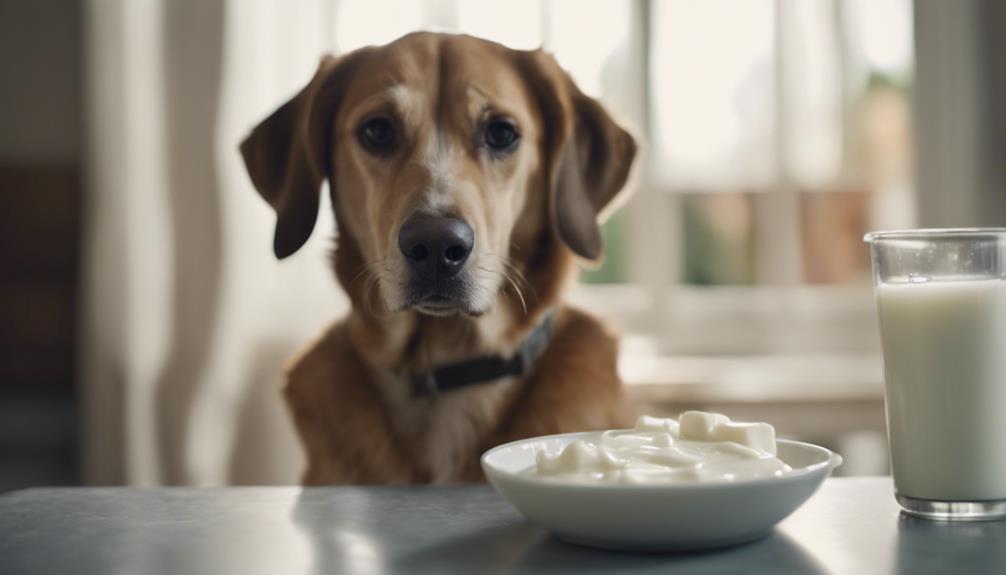In the realm of canine nutrition, the debate surrounding dogs' consumption of milk has persisted, raising questions about the potential impact on their well-being. While the idea of a dog lapping up a bowl of milk may seem charming, the implications of dairy on their health are more intricate than meets the eye.
Understanding the reasons behind why dairy might not be the most suitable choice for your canine companion involves delving into aspects such as milk allergies, lactose intolerance, and the effects of high-fat content. By unraveling these complexities, pet owners can make informed decisions for their furry friends' dietary needs.
Key Takeaways
- Milk, especially cow's milk, can trigger allergies and digestive issues in dogs.
- Plant-based milks like almond, oat, and coconut milk are not suitable for dogs.
- Dogs can be lactose intolerant, leading to bloating and diarrhea from milk consumption.
- Understanding lactose intolerance in dogs is crucial to avoid gastrointestinal problems when feeding dairy.
Milk Allergies in Dogs
Milk allergies in dogs pose a significant concern due to the potential adverse reactions and sensitivities they can trigger in canine companions. When dogs are allergic to milk, they may exhibit a range of symptoms, including itchiness, vomiting, diarrhea, and skin issues. These reactions stem from the immune system's response to certain proteins in milk, such as casein or whey.
It's crucial for pet owners to be aware of these potential allergies and to avoid feeding their dogs milk or dairy products if allergic reactions are observed. Consulting with a veterinarian for proper diagnosis and guidance on suitable dietary alternatives is essential to ensure the health and well-being of dogs with milk allergies.
Risks of Sharing Milk
Caution should be exercised when considering sharing dairy products with dogs due to the potential risks associated with their consumption. It's essential to be aware of the following risks:
- Allergic Reactions: Dogs may develop milk allergies, leading to symptoms like itchiness and vomiting.
- Digestive Upset: Milk can cause diarrhea and stomach upset, especially in constipated dogs.
- Lactose Intolerance: Dogs can be lactose intolerant, resulting in bloating and diarrhea upon consuming dairy.
- Nutritional Concerns: While high in fat and calories, milk may not provide sufficient nutrients for dogs, necessitating a balanced diet.
Being mindful of these risks can help pet owners make informed decisions regarding sharing milk with their furry friends.
Goat Milk for Puppies

Considering the unique nutritional requirements of young puppies, particularly in relation to dairy products, the suitability of goat milk for this vulnerable age group warrants careful consideration. Goat milk is often touted as a potential alternative to cow's milk due to its lower lactose content and easier digestibility. For puppies who may struggle with lactose intolerance or allergies to cow's milk, goat milk could be a gentler option.
It contains essential nutrients such as calcium, vitamins, and minerals that are beneficial for growing puppies. However, it is crucial to consult with a veterinarian before incorporating goat milk into a puppy's diet to ensure that it meets their specific nutritional needs and does not cause any adverse reactions.
Moderation With Milk
Incorporating milk into a dog's diet should be approached with careful moderation to prevent potential adverse reactions and health issues. It's important to consider the following points:
- Monitor for Allergic Reactions: Watch for signs of milk allergy such as itchiness and vomiting.
- Limit Intake: Due to high fat and calorie content, offer milk sparingly to avoid weight gain and digestive issues.
- Consider Individual Tolerance: Some dogs may be lactose intolerant, leading to bloating and diarrhea; adjust milk consumption accordingly.
- Consult a Veterinarian: If unsure about including milk in your dog's diet, seek professional advice to ensure their well-being.
Dairy and Constipation in Dogs

Dairy consumption can exacerbate constipation in dogs, necessitating careful consideration of their digestive health. While milk is often perceived as a hydrating and nutritious option, its high-fat content can lead to gastrointestinal issues in canines, including constipation.
When dogs experience constipation, introducing dairy products like milk can further worsen the condition due to their potential to cause stomach upset and diarrhea. It is crucial for pet owners to be aware of how dairy can affect their dog's digestive system and to seek alternative solutions to alleviate constipation, such as increased exercise or consulting with a veterinarian for appropriate dietary adjustments.
Lactose Intolerance Symptoms
When observing a dog's response to dairy consumption, recognizing the manifestations of lactose intolerance becomes paramount for ensuring the pet's digestive health. Lactose intolerance in dogs can lead to uncomfortable symptoms that indicate their inability to properly digest lactose. Here are some common signs of lactose intolerance in dogs:
- Bloating: Dogs may experience abdominal discomfort and bloating after consuming dairy products.
- Diarrhea: Loose stools or increased bowel movements can be a sign of lactose intolerance in dogs.
- Flatulence: Dogs may exhibit increased gas production and flatulence due to lactose intolerance.
- Abdominal Pain: Some dogs may show signs of discomfort or pain in the abdominal region after ingesting lactose-containing foods.
Plant-Based Milk Risks

Plant-based milk alternatives pose potential risks for dogs due to allergenic properties and digestive disturbances. While these milk alternatives may seem like a healthy choice, they can have adverse effects on our canine companions. Below is a table highlighting some risks associated with plant-based milks for dogs:
| Risk | Description | Potential Impact |
|---|---|---|
| Allergenic Properties | Plant-based milks can trigger allergies in dogs | Itching, rashes, or hives |
| Digestive Disturbances | These milks may upset a dog's stomach | Diarrhea, vomiting, bloating |
It's important to be cautious when considering plant-based milk as an option for your dog's diet to ensure their health and well-being.
Almond Milk Concerns
Considering potential risks associated with plant-based milk alternatives for dogs, almond milk raises specific concerns regarding its impact on canine health. When it comes to almond milk, dog owners should be cautious due to the following reasons:
- Xylitol Content: Almond milk may contain xylitol, a sweetener that is toxic to dogs.
- High Fat and Calorie Levels: Almond milk is high in fat and calories, which can lead to weight gain and other health issues in dogs.
- Allergenic Potential: Dogs can be allergic to almonds, leading to allergic reactions such as itchiness, swelling, or digestive problems.
- Lack of Essential Nutrients: Almond milk lacks essential nutrients that dogs need for a balanced diet, potentially causing deficiencies over time.
Oat Milk Digestive Issues

Digestive challenges may arise in dogs when consuming oat milk due to its high fiber content. While oat milk is popular among humans as a dairy alternative, it may not sit well with our canine companions. The abundance of fiber in oat milk can lead to gastrointestinal issues in dogs, such as bloating, gas, and potential diarrhea.
—
| Oat Milk Digestive Issues in Dogs | |||
|---|---|---|---|
| Concern | Symptoms | Impact | Management |
| High fiber content | Bloating | Gastrointestinal | Monitor intake |
| Gas | Discomfort | Consider alternatives | |
| Diarrhea | Digestive upset | Consult veterinarian |
Coconut Milk Allergy
An adverse reaction to coconut milk may manifest as an allergy in dogs, necessitating caution when considering its inclusion in their diet. Coconut milk allergy in dogs can present various challenges and potential health risks. Here are some key points to keep in mind:
- Symptoms: Allergic reactions to coconut milk in dogs may include itching, hives, gastrointestinal upset, or even more severe responses like difficulty breathing.
- Diagnosis: Identifying a coconut milk allergy in dogs often requires consultation with a veterinarian and may involve allergy testing or elimination diets.
- Treatment: Managing a coconut milk allergy in dogs typically involves avoidance of coconut milk and any products containing it, along with potential medical intervention as advised by a veterinarian.
- Prevention: Preventing exposure to coconut milk and being vigilant about reading ingredient labels can help minimize the risk of allergic reactions in dogs.
Understanding Lactose Intolerance

Upon encountering dairy-related allergies or sensitivities in dogs, a crucial aspect to comprehend is their potential for lactose intolerance. Dogs can be lactose intolerant due to decreased lactase production, the enzyme responsible for breaking down lactose in milk.
Signs of lactose intolerance in dogs include bloating, gas, diarrhea, and gastrointestinal discomfort after consuming dairy products. Due to their limited ability to digest lactose, dogs may struggle with non-canine milk, leading to digestive issues.
It is important for dog owners to be aware of their pet's individual tolerance to lactose and consider alternative dietary options to prevent gastrointestinal problems and ensure their dog's overall health and well-being.
Caution With Human Foods
Exercising caution when offering human foods to dogs is crucial in maintaining their health and well-being.
Caution With Human Foods:
- Avoid These Foods: Grapes, raisins, chocolate, onions, garlic, and products containing xylitol are toxic to dogs.
- Limit Fatty Foods: High-fat foods can lead to pancreatitis in dogs.
- Watch for Bones: Cooked bones can splinter and cause internal injuries.
- Moderation is Key: Treats like peanut butter should be unsalted and given in moderation to prevent obesity and digestive issues.
Conclusion
In conclusion, the risks associated with milk allergies, lactose intolerance, and high-fat content make dairy products a questionable choice for dogs' diets. Pet owners should exercise caution when considering incorporating milk into their dogs' nutrition, opting for alternatives like goat milk or plant-based options.
Understanding the potential digestive issues and allergies linked to dairy consumption in dogs is crucial for promoting their overall health and well-being.




